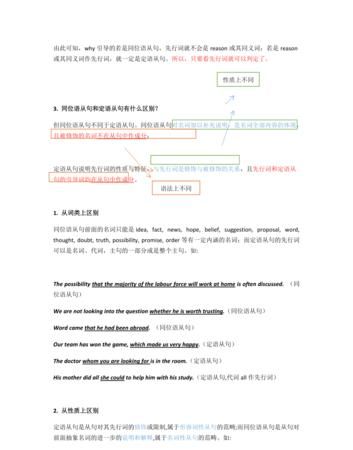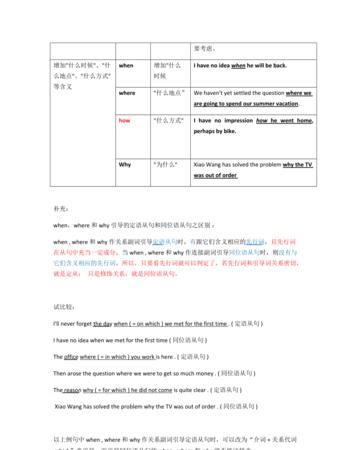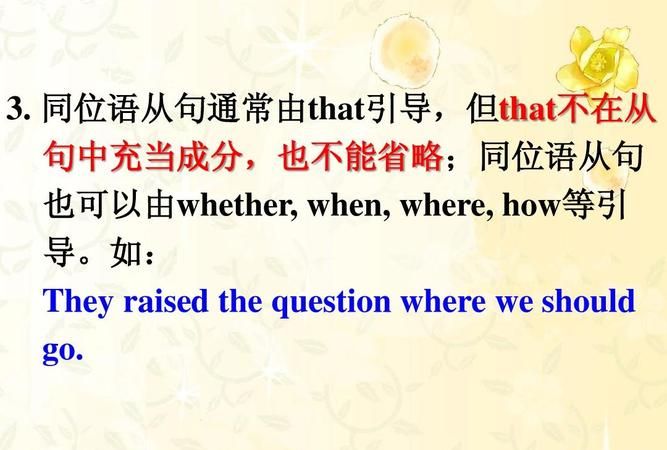本文目录
同位语从句的英语语法总结
关于同位语从句的英语语法
1.同位语从句:whether

whether可以引导同位语从句,而定语从句不能用whether作为引导词。
He hasn’t made the decision whether he will go there.
他还没有做出决定是否去那里。
I have small doubt whether he is suitable for the job.
他是否适合这件工作我有点怀疑。
2.同位语从句:that
些名词的后面可以接that引导的同位语从句:
We came to the decision that we must act at once. 我们做出决定:我们必须立即行动。
He made a proposal that the meeting be postpone. 他提议会议延期。
There was little hope that he would survive. 他幸存的希望很小。
在非正式语体中that可以省略。
以下名词常用于以上句型:
advice, announcement, argument, belief, claim, conclusion, decision, evidence, explanation, fact, feeling, hope, idea, impression, information, knowledge, message, news, opinion, order, probability, promise, proposal, remark, reply, report, saying, statement, suggestion, thought, treat, warning, wish, word
3.同位语从句:what
what可以引导同位语从句,而定语从句不能用what作为引导词
I have no idea what he is doing now. 我不知道他现在在干什么。
4.同位语从句:how
how可以引导同位语从句,而定语从句不能用how作为引导词
It’s a question how he did it. 那是一个他如何做了此事的`问题。
5.同位语从句:who等
who, whom, which, when, where, why用来引导同位语从句
The question who should do the work requires consideration.
谁该干这项工作,这个问题需要考虑。
She raised the question where we could get the fund.
她提出这个问题:我们到哪儿去搞这笔资金。
6.同位语从句和定语从句的区别
1)同位语从句和先行词是同等的关系;而定语从句是用来修饰先行词,是从属的关系。
2)that在同位语从句中没有词义,不充当句子成分;而在定语从句中充当主语、宾语等句子成分。
3)whether, what, how可以用来引导同位语从句;而它们不能用来引导定语从句。
;HOW 能否引导同位语从句 例:You have no idea how depressed you have madetoher
how可以引导同位语从句,又如:
I have no idea how he is.
后面不加to。我们可以用还原法进行检验,即把同位语从句抽出来变成一个独立的句子,得:
How depressed have you made her?
这是一个感叹句,how意思是“多么”。
再把它变成陈述句,得:
You have made her depressed.
很明显,depressed是一个形容词,在这里作宾补。make是使役动词,her直接作make的宾语,中间是不加to的。

同位语从句的概念及用法总结
同位语从句属于名词性从句,大多由连词that引导,常常跟在fact, idea, opinion, news, hope, belief等名词后面.同位语从句一般用来解释或说明这些名词的具体含义或内容,在逻辑上表现为同位关系.
They are familiar with the opinion that all matter consists of atoms.
他们很熟悉这一观点,所有的物质都是由原子构成的
从先行词来看
同位语从句与名词之间该名词是需要做特殊说明的名词.idea, fact, news, hope, belief, suggestion, word, thought, doubt, truth, possibility, promise, order等有一定内涵的名词
They were delighted at the news that their team had won.
当听到他们的球队赢了的消息时,他们欣喜若狂.
定语从句与先行词---可以是名词?代词?主句的一部分或是整个主句
The factory(that)we visited yesterday is a chemical one.
2、从引导词that来看
引导词that在同位语从句中是连词,只起连接作用,无具体词义,that不可省略;
that在定语从句中是关系代词,它在从句中充当一定成分---主语或宾语,有具体词意,作宾语时还可以省略.试比较:
The factory(that)we visited yesterday is a chemical one.我们昨天参观的那家工厂是化工厂.
The news that he will leave for Shanghai is true.他将要去上海的消息是真的.
(that只起连接从句的作用,所以此句是同谓语从句)
3.从句的功能与性质
定语从句是形容词从句,其作用相当于一个形容词,对其先行词的修饰或限制;
同位语从句是名词从句,其作用相当于一个名词,对前面抽象名词的进一步的说明和解释The news that our team has won the game was true. 我们队赢了那场比赛的消息是真的?
(同位语从句,补充说明news到底是一个什么消息?)
The news that he told me yesterday was true. 昨天他告诉我的那个消息是真的?
(定语从句,news在从句中作told的宾语?)
4. 引导词在从句担当的成分
有些引导词如how, whether, what可以引导同位语从句,但不能引导定语从句?
定语从句的引导词that在从句中充当一定的成分,可作主语、宾语、
同位语从句中的引导词that在从句只起连接作用,不作任何句子成分.
1. A plane is a machine that can fly. 飞机是一种能飞的机器.
2. The fact that they didn't finish the work has to be faced. 必须面对事实他们没有完成工作.
例1中的引导词that在从句中充当句子成分,作从句的主语,故为定语从句;
例2中的that起连接作用,引导从句解释fact的内容,不作任何句子成分,为同位语从句.
5.引导词担当成分时的省略
引导定语从句的关联词在从句中作宾语或状语时,可以省略或被其他词代替;介词+which
同位语从句的引导词一般不能省略,更不能被代替.
1. The news that she heard is true. 她听到的消息是真的.
2. The news that she will go abroad is true. 她将出国这消息是真的.
例1是定语从句,that可省略;例2是同位语从句,that不能省略.
3. The reason why he was chosen is unknown. 他为什么被选上的原因还是不清楚 (定)
4. The idea why he was chosen attracted our attention.
他为什么会被选上,这一想法引起我们的注意. (同位语从句)
四、同位语从句与其所修饰的名词之间是一种同位关系,二者之间存在逻辑上的系表关系,可用“主+系+表”结构来表示.例如:
The news that he won the first place is true. 他赢得冠军的那个消息是真的.
上句若用“主+系+表”结构来表示,则是:
The news is that he won the first place. 消息是他赢得了冠军.
意思合理,系表结构成立,故为同位语从句.
五、定语从句所修饰、限定的先行词可以是各类名词,可以有复数形式;而同位语从句一般都与抽象名词同位,一般没有复数形式.
六、由when, why, where引导的定语从句分别修饰或说明表示时间、原因或地点的词,
但它们引导的同位语从句一般不和表示时间或地点的词同位.例如:
定1. I still remember the day when I first came to Beijing. 我仍然记得初次来北京的那天.
同2. I have no idea when she will be back. 我不知道她何时回来.
定3. This is the house where I lived two years ago. 这是我两年前住的房子.
同4. The question where we shall have a meeting hasn't decided. 我们到什么地方去开会,这个问题没有决定.
同位语从句:that 有些名词的后面可以接that引导的同位语从句:We came to the decision that we must act at once. 我们做出决定:我们必须立即行动.There was little hope that he would survive. 他幸存的希望很小
同位语从句:whether whether可以引导同位语从句,而定语从句不能用whether作为引导词. He hasn’t made the decision whether he will go there他还没有做出决定是否去那里. I have small doubt whether he is suitable for the job. 他是否适合这件工作我有点怀
同位语从句:what what可以引导同位语从句,而定语从句不能用what作为引导词
I have no idea what he is doing now. 我不知道他现在在干什么
同位语从句:how how可以引导同位语从句,而定语从句不能用how作为引导词
It’s a question how he did it. 那是一个他如何做了此事的问题
同位语从句: who, whom, which, when, where, why用来引导同位语从句
The question who should do the work requires consideration.
谁该干这项工作,这个问题需要考虑.
She raised the question where we could get the fund. 她提出这个问题我们到哪儿去搞这笔资
同位语从句和定语从句的区别
1同位语从句和先行词是同等的关系;而定语从句是用来修饰先行词,是从属的关系
2)that在同位语从句中没有词义,不充当句子成分;而定语从句中充当主语、宾语等成分
3)whether, what, how可以用来引导同位语从句;而它们不能用来引导定语从句.
4)一 从词义角度看问题 who, whom, which, when, where, why用来引导同位语从句是保持原来疑问词的含义;它们用来引导定语从句时,不具有疑问词的含义二 从搭配角度看问题who, whom, which, when, where, why用来引导定语从句时对应性很强,如: 先行词是“人”,引导词用“who”等,而它们引导同位语从句是先行词通常是“question, idea, doubt等

how同位语从句例句
疑问代词who, which, what 和疑问副词where, when, why, how可以引导同位语从句。例如:
It is difficult to answer your question how I did it. 很难回答你提出的我是如何做的问题。
It is a question how he did it. 那是一个他如何做的问题。
You have no idea how worried your parents were! 你不知道你父母有多着急!
We had no idea why she left. 我们不知道她为啥离开。
I have no idea when he will come. 我不知道他什么时候来。
The question who should do the work requires consideration. 谁该干这项工作,这个问题需要考虑。

以上就是关于how同位语从句 ,同位语从句的英语语法总结的全部内容,以及how同位语从句 的相关内容,希望能够帮到您。
